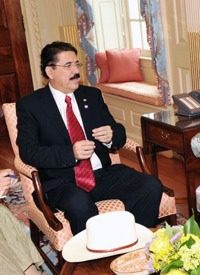
Zelaya is expected to press the United States to impose economic sanctions on the new government of President Roberto Micheletti, who was appointed by the nation’s congress to replace Zelaya.
During a national broadcast on July 6, Micheletti said: "I am confident Secretary Clinton will recognize the rule of law is the reason we are here and that Mr. Zelaya should account for his unconstitutional position."
The phrase "rule of law" is the textbook definition of a republic — in contrast with a democracy — which through simple majority rule often disregards minority rights protected by a nation’s constitutional structure.
A July 7 Reuters News report observed that "Zelaya’s leftist allies in the region led by Venezuelan socialist President Hugo Chavez, a longtime U.S. adversary, have been the most vocal in demanding his return…. Zelaya, a timber magnate, angered opponents by shifting to the left and allying with Chavez after becoming president in 2006. He had been due to leave office in 2010."
The new Micheletti government has also sent a delegation to Washington to bolster its claim as Honduras’ legitimate governing power. The delegates, including former president Ricardo Maduro, are expected to hold talks with U.S. lawmakers, officials, and journalists, as well as with the Organization of American States (OAS), which expelled Honduras from membership in the organization on July 5.
The Washington Post quoted Roberto Flores-Bermudez, Honduras’ ambassador to the United States, who is assisting the delegation: "They come here because they feel that the multilateral organizations have not given Honduras a chance to express itself. There has been a blockage of communication with my country."
President Barack Obama, meanwhile, in a speech delivered to Moscow graduates on July 7, repeated previous support for Zelaya’s efforts to return to the presidency. "America supports now the restoration of the democratically elected president of Honduras, even though he has strongly opposed American policies," said Obama. "We do so not because we agree with him. We do so because we respect the universal principle that people should choose their own leaders, whether they are leaders we agree with or not."
A July 7 BBC News report by the network’s Caracas, Venezuela, correspondent, Will Grant, provided an enlightening look at the strong bond forged between Zelaya and Marxist strongman Hugo Chavez. Commenting on the non-stop Venezuelan coverage of the Honduran crisis, Grant observed:
The around-the-clock focus points to how closely the Venezuelan president, Hugo Chavez, and his supporters are following events in Tegucigalpa and how keen they are to see Mr. Zelaya back in office.
The two leaders are allies, although Mr. Chavez did not, as some have suggested, fund Mr. Zelaya’s election campaign.
In fact, the two had not met until after Mr Zelaya came to power in 2005 on a very different platform to the left-wing, populist policies of Mr. Chavez.
Grant quoted Demetrio Boersner, identified as a professor of international relations at the Central University of Venezuela (UCV) and a former diplomat:
Chavez embraces anyone who he thinks may be useful to his cause. Ever since Zelaya showed signs of wanting to move in that political direction, Mr. Chavez has been encouraging him at every turn.
I also have no doubt that there is a constant dialogue between the two men and I am sure President Chavez is playing a leading role in the decisions being taken by the Zelaya advisers at this sensitive time.
Grant also noted: "The strange alliance of US President Barack Obama, the Organization of American States (OAS) and President Chavez is tightening the screws on Roberto Micheletti via diplomatic and economic means," and observed, "Pressure is growing on President Obama to withhold U.S. aid to Honduras and force Mr. Micheletti and his supporters from the presidential palace."
In "Honduras Is Right About Zelaya," an article for Human Events posted online on July 7, Jose S. Sorzano — who was the deputy U.S. ambassador to the United Nations from 1983 to 1985 — defended the removal of Zelaya from office in the manner in which it was accomplished. Sorzano discusses a phenomenon unique to Latin American politics "continuismo," which he defines as "the continuity in power of a caudillo or strong man (not necessarily a military officer) who through demagogic means and repression extends his tenure for years, even decades." He names Hugo Chavez as a prime example of a ruler who has used this technique to lengthen his rule, and suggested that Zelaya — a protégé of Chavez — was attempting something similar in Honduras. Sorzano notes:
It is in this context of the anti-democratic, authoritarian Left deploying a new way to obtain and maintain power that the recent events in Honduras have to be judged. President Zelaya tried, but so far has failed, to replicate Chavez’s success. And the reason should be obvious to all who have been watching political trends in the region during the past decade. The Hondurans have, in effect, literally seen the movie. They know how it ends and told Zelaya that they would not let him play the movie in their own theater.
Sorzano also recognized an ironic element to the world’s condemnation of those who ousted Zelaya in favor of Micheletti:
To see Zelaya as a victim, as the OAS, the U.N. and our own State Department do, is to see the situation upside down. One indication of the absurdity of this charade is that the expulsion of Honduras from the OAS will take place just weeks after the same body voted to re-admit Castro’s Cuba to its fold. If Cuba should be a member of the OAS, then, surely, Honduras also belongs in the OAS.
Perhaps because of his prior service as deputy U.S. ambassador to the UN, Sorzano, in his well-presented analysis, still regards membership in supranational organizations such as the UN and the OAS as something beneficial to the member states. In this regard, Honduras is in much the same position as Taiwan, which was expelled by the UN in 1971. Instead of pitying these independent nations that were ejected from these sovereignty-threatening internationalist bodies, we would do better to join them.
Photo: AP Images



